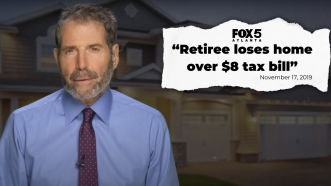Property Rights
The 'Montana Miracle' Vindicated in Court
On Monday, a Montana judge roundly rejected homeowners' legal challenge to new laws allowing duplexes and accessory dwelling units in single-family areas.
Upcoming Event on "Solving the Nation's Housing Crisis"
Economist Bryan Caplan and I will speak at event sponsored by the Schar School of Policy and Government at George Mason University.
Hawaii Can Auction Off Your Car Without Ever Convicting You
Civil forfeiture allows the government of Hawaii to take your property and sell it for profit without proving you did anything wrong.
The Best of Reason: How the Fair Housing Act Gave Us Emotional Support Parrots
The right to a reasonable accommodation has produced some absurd results.
Why Are We Fighting?
When regulations limit what kind of housing can be built, the result is endless arguments about what people really want.
How the Fair Housing Act Gave Us Emotional Support Parrots
The right to a reasonable accommodation has produced some absurd results.
The Government Says Money Isn't Property—So It Can Take Yours
In a jaw-dropping argument, the Department of Justice claims seizing $50,000 from a small business doesn’t violate property rights because money isn’t property.
What Process Is Due Before Property Is Destroyed?
The Sixth Circuit finds a city failed to provide adequate process before demolishing a condemned mobile home.
18 Months After Wildfires Destroyed Some 2,000 Homes on Maui, Only 3 Have Been Rebuilt
A thicket of red tape has made the island's rebuilding efforts painfully slow.
Our Amicus Brief Urging the Supreme Court to Hear Case on Overruling Kelo v. City of New London
The brief is on behalf of the Cato Institute and myself.
In Session
Lawmakers across the country introduce bills to strengthen private property rights, crackdown on out-of-control regulators, and get the government out of micromanaging stairways.
Nevada Judge to Nevada Cops: You Can't Use This Loophole To Get Around Civil Asset Forfeiture Reform
The Nevada Highway Patrol exceeded its legal authority when it seized nearly $90,000 in cash from Stephen Lara in 2023 and then handed the case to the DEA.
Easing Zoning Restrictions Can Facilitate Rebuilding After the LA Fires
The destruction of numerous homes exacerbated the city's already severe housing crisis. Curbing exclusionary zoning is crucial to addressing the problem.
He Lost the Title to His Home Over a Small Property Tax Debt. Years Later, He's Finally Getting It Back.
A local government gave ownership of Kevin Fair's Nebraska house—and all of its value—to a private investor, in a practice known as home equity theft.
Supreme Court Can Protect Property Owners From Eminent Domain Abuse
A Utica, New York, land grab offers the justices an opportunity to revisit a widely criticized precedent.
The Government Took a Developer's Land and Gave It to a Competitor. In New York, That's Business As Usual.
The case gives the Supreme Court an opportunity to revisit a widely reviled decision that invited such eminent domain abuses.
Institute for Justice Petitions Supreme Court to Take Case Seeking to Overrule Kelo v. City of New London
Kelo is the 2005 ruling in which the Supreme Court held that the government can take property for private "economic development.""
North Carolina Passes Sweeping Surprise Ban on 'Downzoning'
To the bewilderment of many, North Carolina's hurricane relief bill includes the nation's strongest property rights protections against new zoning restrictions.
Social Security Is Deeply Unfair. The Social Security Fairness Act Won't Fix That.
What is paid out to Social Security beneficiaries is not a return on workers' investments. It's just a government expenditure, like any other.
Is the YIMBY Movement Hopelessly Divided?
Internal tensions within the movement are real, but far from irreconcilable. Litigation and political reform are mutually reinforcing, not mutually exclusive pathways to curbing exclusionary zoning.
How Exclusionary Zoning Increases Homelessness
A new paper by housing expert Salim Furth shows it does so by making it harder for marginal people to find housing with relatives and friends.
Biden's COVID-19 Response Eroded Civil Liberties
Mandates, school closures, and overreach defined an administration that doubled down on failed policies.
This Thanksgiving, Be Thankful for Free Markets
The Pilgrims learned this lesson the hard way. Fast forward 400 years, and many Americans have forgotten.
Justice Gorsuch Wants To Hear More (Takings) Cases
Justice Gorsuch shows more interest in property rights challenges than his colleagues on the Court.
The Housing Election That Won't Fix the Housing Crisis
Victory in the fight for cheaper housing, a more liberal land-use regime, and greater property rights won't come from the White House.
Final Published Version of "The Constitutional Case Against Exclusionary Zoning" Now Available
In this Texas Law Review article, Josh Braver and I argue that most exclusionary zoning violates the Takings Clause of the Fifth Amendment.
Saudi Arabia's 'The Line' Violates Human Rights and Common Sense
Inhumane labor practices, worker deaths, and the forced eviction and repression of local residents have characterized the kingdom's efforts to build a miles-long linear skyscraper in the desert.
After 100 Years, End the Open Fields Doctrine
Federal agents are allowed to search private property without a warrant under this Prohibition-era Supreme Court precedent.
Supreme Court Refuses to Hear "Passive Park" Public Use Property Rights Case
While I am eager for the Court to take another public use case, I am actually happy the justices chose to reject this one. Its unusual facts made it a poor vehicle for revisiting Kelo v. City of New London.
Local Governments Are Seizing and Selling Homes Over Small Tax Debts
Home equity theft happens when governments auction off seized houses and keep the profits—even once the tax bill is paid.
In Rush to Redevelop, a California City Tramples Property Rights
Urban renewal efforts should recognize that existing businesses and new residents can coexist.
Chip Mellor's Legacy Promotes a Broader Concept of Civil Liberties
For more than three decades, the Institute for Justice has shown that economic freedom and private property are essential safeguards for ordinary Americans.
William "Chip" Mellor, RIP
Mellor was cofounder and longtime president of the Institute for Justice, one of the nation's leading public-interest law firms.
What Happens When FEMA Buys Your House?
As hurricane damage mounts, the government is buying—and sometimes seizing—homes in flood-prone areas, sparking concerns over property rights and accusations of discrimination.
D.C.'s COVID-Era Eviction Policies Come Back To Bite
Plus: Massachusetts NIMBYs get their day in court, Pittsburgh one-step forward, two-steps back approach to zoning reform, and a surprisingly housing-heavy VP debate.
Learning the Wrong Lessons From the Eminent Domain Legacy at Chavez Ravine
Progressives are trying to fix the errors of the past, but they're ignoring the best solution: More robust property rights.
Governments Are Still Stealing People's Home Equity Over Modest Tax Debts
A handful of states use loopholes to get around a Supreme Court ruling that declared the practice unconstitutional.
Virginia Court Rules Against Arlington "Missing Middle" Zoning Reform
The ruling highlights need for state-level zoning reform and stronger judicial protection of constitutional property rights.
Revised Versions of Articles on "The Constitutional Case Against Exclusionary Zoning" and "Land Use Regulation" Now Available
Revised versions of both publications are now up on SSRN.
Will SCOTUS Take on New York's Latest Eminent Domain Scam?
Two brothers are asking the Supreme Court to stop their town from using eminent domain to steal their land for an empty field.
New London Gives $6.5 Million in Tax Breaks to Developer Planning to Build Housing on Land Condemned in the Kelo Case
The property has remained empty for almost twenty years, after the Supreme Court's controversial ruling upholding its condemnation to promote "economic development."









































